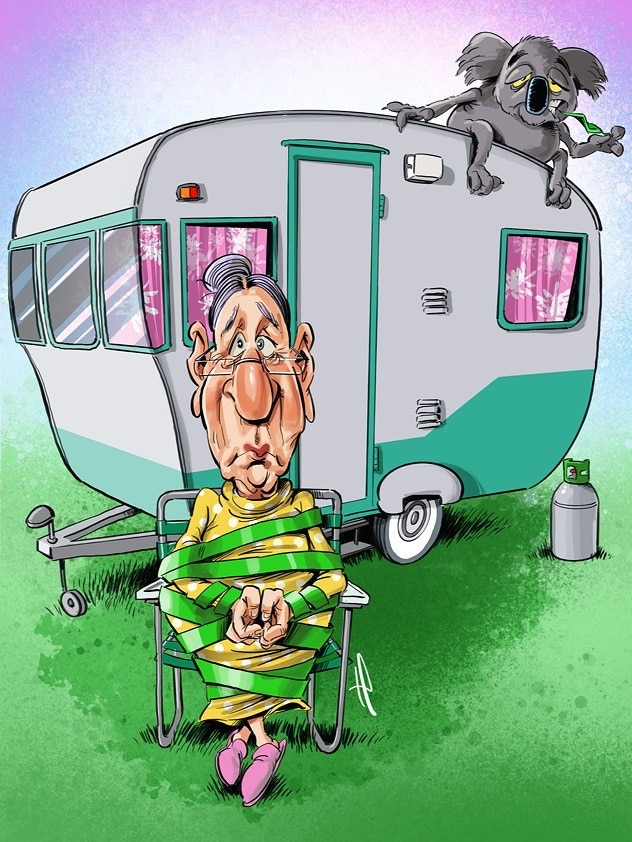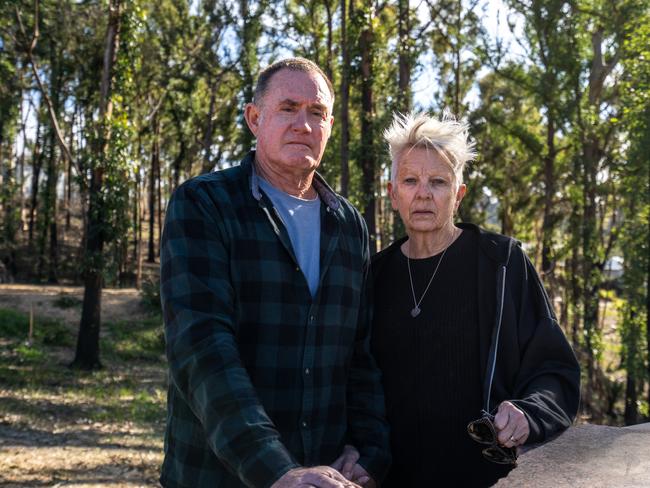The government must help — not hinder — bushfire victims who want to rebuild
Costly, time-consuming environmental assessments are keeping bushfire victims from rebuilding on their own land. The government must end this mess — now, writes Anna Caldwell.
Opinion
Don't miss out on the headlines from Opinion. Followed categories will be added to My News.
When Bev Wallis and her husband fled their burning Malua Bay property on New Year’s Eve, they had nothing but the clothes on their backs.
Left behind were 35 years of memories and three generations of irreplaceable treasures — the family Bible which was hundreds of years old, the grandmother’s furniture which had been shipped from England, and countless photos, plus everything else they owned.
In the weeks after the horror fires that claimed lives, homes and livelihoods, we all rallied around people like Bev Wallis.
We promised them they would not walk alone. We reached into our own pockets to help them. The government promised it would do all it could to make their rebuilds easier.

Now, seven months later, this 70-year-old woman is living in a caravan and in tears on an almost daily basis with no idea when she will be back in a house.
Hers is not an unusual case.
I’ve uncovered this week that the bushfire rebuild project is on a go-slow, tied up in bureaucratic knots that are making the lives of victims like Bev Wallis unbearable.
While we weren’t looking, progress has ground to a halt.
The state government’s clean-up effort, led by Laing O’Rourke, has made good time and is nearing completion.
However, the next step, which is people rebuilding on their burnt-out land, is dogged by delays. As summer creeps up again, the mental anguish is taking its toll.
One of the biggest problems is the utter confusion which is rife among builders, council and even state government over what is required to satisfy red and green tape requirements, which seem baffling when everything is burnt to the ground.

As a starting point, homeowners are not given outright permission to clear their own land of trees — even when it’s for fire safety to ensure a rebuild complies with bushfire codes.
They are expected to assess the flora and fauna impacts, a costly exercise that requires an expert consultant. On top of that, this year in March the Berejiklian government introduced a requirement for a koala assessment.
Bushfire victims are told these reports cost in the order of thousands of dollars. Some find loopholes to avoid them, others do not, but either way the stress and anxiety takes a toll.
But what’s even worse is the delay caused. Development approvals are piling up in councils with people desperate to get back into their homes.
When Bev Wallis called this week to check on hers, she was told there were hundreds on the desk and she’d have to wait her turn.
The situation is so dire local building designer Paul Dolphin wrote to government ministers Matt Kean and Rob Stokes in May warning people would commit suicide if they weren’t helped through the red tape.
When quizzed on this yesterday, Environment Minister Matt Kean in turn quizzed his department.

The bureaucrats pointed to an email sent to council in May which advised one key red tape requirement, named a “test of significance”, was not required if the council was satisfied there was no “threatened species, an ecological community or their habitats”.
They are expected to use a “biodiversity profile search” or an “atlas of records of species and communities in the local area” or a “previous ecological assessment of the property”.
Confused? Join the club.
Stunningly, not a single builder, homeowner or council officer I spoke to was aware of this apparent exemption.
When I raised it with Mr Dolphin, he said it was meaningless. “They are saying you need an ecologist’s degree to prove you don’t need an ecologist’s report”, he said.
Eurobodalla Mayor Liz Innes said the so-called “exemption” from the department wasn’t good enough.
“If the government is serious about this then simply turn the provisions off for bushfire addresses,” she said.
“This is nothing more than weasel words which does not change the impact on the ground.”

And that’s not good enough.
Gladys Berejiklian needs to send her Planning Minister and her Environment Minister to these sites to look in the eyes of these people who are being asked to funnel thousands of dollars into “ecological assessments” so they can tick the government’s green box.
They need to look those people in the eye and tell them why they can’t clear trees off their own bushfire-scorched land without seeming to need an ecologists degree or a costly report first.
Matt Kean is aware that more needs to be done and the situation is not good enough.
He told me that getting people back on their feet must be the number one priority.
Stokes said government was looking at a fire-property exemption to the koala checks.
This is the right approach and it is reasonable now to then expect some kind of intervention from government to improve the situation.
Yes, of course we should care for our environment. Of course we should protect koalas and trees and ecosystems.
But when you have struggling families and elderly people living in caravans on their burnt-out property, can we not find a sophisticated exemption that first and foremost prioritises getting them a home built at minimal cost?
No one is talking about letting people lop down trees in the heart of the city. We are talking about empowering local landowners in bushfire prone areas to clear their own land to protect their lives and speed up their rebuild.
They should not be treated like criminals and face hefty fines for taking these steps — they should be empowered, supported and thanked.
But more than anything, we must not forget these people.
COVID has taken its toll on all of us. It’s demanded the almost exclusive attention of Premier Berejiklian and her Cabinet since March.
But that must not come at the expense of the victims of this country’s greatest natural disaster, whose lives and recovery were made even harder because of this pandemic.

